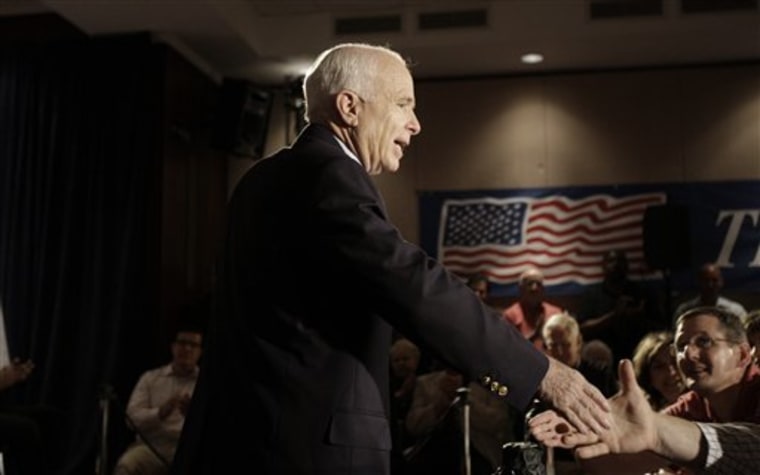Republican John McCain on Friday told autoworkers in an economically depressed area of Ohio that he supports free-trade agreements many of them feel cost jobs, but also government investment to help produce the electric cars of the future.
His confession and commitment followed a tour of a General Motors factory that produces the gas-thrifty Chevrolet Cobalt. Company officials recently announced they will add a third shift — and 1,400 workers — in August so they can build the cars 24 hours a day.
GM has also announced plans to build in 2010 the Chevrolet Volt, a vehicle that will travel 40 miles by battery power but have a seven-gallon gas tank extending its range to 140 miles. Most commutes are within the 40-mile range.
McCain praised both developments as he also made the pitch for an energy strategy that calls for more oil production, development of a revolutionary automotive battery pack and conservation by the federal government in its buildings and its huge auto fleet.
"We must develop vehicles such as are being developed here," the presidential contender told employees attending a town-hall meeting just steps from the assembly line. "We can lead again in the automotive industry and that can lead to thousands of jobs."
The Mahoning Valley is a Democratic stronghold that blames its economic woes on the kind of free-trade policies that McCain supports.
The region lost 16,600 jobs from 2000 through 2007, almost all of them in the manufacturing sector. Democrat Hillary Rodham Clinton visited the same GM factory in February to announce a plan to reduce the influence on special interests on government decisionmaking.
While McCain received a respectful welcome from a largely union audience, one employee firmly asked him about trade pacts such as the North American Free Trade Agreement and the Central American Free Trade Agreement — both of which workers believe have triggered job shifts to Canada, Mexico and Central America.
McCain supports the agreements but Democratic rival Barack Obama has threatened to unilaterally re-open NAFTA if labor and environmental concessions are not made.
The worker who asked the question, 37-year-old Raymond Francisco, moved his family to Ohio after GM closed the sport-utility vehicle factory where he worked in Linden, N.J.
"I don't believe that every trade agreement is totally fair, and we do have mechanisms in these agreements where you can bring suit where unfair practices exist," McCain told Francisco. "I would say that if and when we conclude additional free trade agreemnts, perhaps we could do a better job of setting up and implementing mechanisms that would address unfair or violations, basically, of the free trade agreements that we make."
McCain added: "But I do believe that there are some realities of life, and that is that when we practice protectionism and we erect barriers to the products from other countries, they do the same to us and then it leads to economic consequences. I think that was the case in the 1930s. I think that our protectionism and isolationism led from a recession to a deep depression."
At another point, a woman asked McCain how he aimed to helped the industry itself.
The senator pledged federal funding for research and development efforts, but, again, said he would not coddle the industry. At another point, he said point-blank he would not favor a government bailout package for automakers.
"Once we develop that technology with pure research and development, then we've got to hand it over to the private enterprise — the automotive companies. I do not think we should be in direct competition," the senator said.
It was such a tactic, he said, that led to the government-developed Internet triggering a private enterprise boon.
Later, speaking with reporters aboard his campaign bus, McCain said he is spending a "great deal of time" seeking his running mate, but he still is not sure when he will announce his choice. Nonetheless, he said the timing would not be influenced by when Obama announces his vice presidential choice.
"I think that as soon as I can reach a point of decision, we should go ahead with it. I don't think that should affect the timing. ...It should have everything to do with our process and priority," said McCain.
